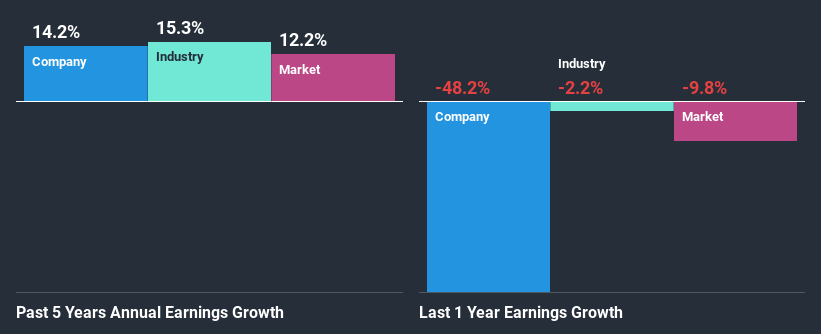Insecticides (India) Limited's (NSE:INSECTICID) Fundamentals Look Pretty Strong: Could The Market Be Wrong About The Stock?

With its stock down 4.9% over the past three months, it is easy to disregard Insecticides (India) (NSE:INSECTICID). However, the company's fundamentals look pretty decent, and long-term financials are usually aligned with future market price movements. In this article, we decided to focus on Insecticides (India)'s ROE.
Return on equity or ROE is an important factor to be considered by a shareholder because it tells them how effectively their capital is being reinvested. Put another way, it reveals the company's success at turning shareholder investments into profits.
View our latest analysis for Insecticides (India)
How Do You Calculate Return On Equity?
ROE can be calculated by using the formula:
Return on Equity = Net Profit (from continuing operations) ÷ Shareholders' Equity
So, based on the above formula, the ROE for Insecticides (India) is:
8.5% = ₹678m ÷ ₹8.0b (Based on the trailing twelve months to September 2020).
The 'return' is the income the business earned over the last year. One way to conceptualize this is that for each ₹1 of shareholders' capital it has, the company made ₹0.08 in profit.
Why Is ROE Important For Earnings Growth?
Thus far, we have learned that ROE measures how efficiently a company is generating its profits. We now need to evaluate how much profit the company reinvests or "retains" for future growth which then gives us an idea about the growth potential of the company. Assuming all else is equal, companies that have both a higher return on equity and higher profit retention are usually the ones that have a higher growth rate when compared to companies that don't have the same features.
Insecticides (India)'s Earnings Growth And 8.5% ROE
It is hard to argue that Insecticides (India)'s ROE is much good in and of itself. Not just that, even compared to the industry average of 11%, the company's ROE is entirely unremarkable. However, the moderate 14% net income growth seen by Insecticides (India) over the past five years is definitely a positive. Therefore, the growth in earnings could probably have been caused by other variables. Such as - high earnings retention or an efficient management in place.
We then performed a comparison between Insecticides (India)'s net income growth with the industry, which revealed that the company's growth is similar to the average industry growth of 15% in the same period.

Earnings growth is an important metric to consider when valuing a stock. The investor should try to establish if the expected growth or decline in earnings, whichever the case may be, is priced in. Doing so will help them establish if the stock's future looks promising or ominous. If you're wondering about Insecticides (India)'s's valuation, check out this gauge of its price-to-earnings ratio, as compared to its industry.
Is Insecticides (India) Efficiently Re-investing Its Profits?
Insecticides (India)'s three-year median payout ratio to shareholders is 5.5% (implying that it retains 94% of its income), which is on the lower side, so it seems like the management is reinvesting profits heavily to grow its business.
Besides, Insecticides (India) has been paying dividends for at least ten years or more. This shows that the company is committed to sharing profits with its shareholders.
Conclusion
Overall, we feel that Insecticides (India) certainly does have some positive factors to consider. With a high rate of reinvestment, albeit at a low ROE, the company has managed to see a considerable growth in its earnings. While we won't completely dismiss the company, what we would do, is try to ascertain how risky the business is to make a more informed decision around the company. Our risks dashboard will have the 1 risk we have identified for Insecticides (India).
If you decide to trade Insecticides (India), use the lowest-cost* platform that is rated #1 Overall by Barron’s, Interactive Brokers. Trade stocks, options, futures, forex, bonds and funds on 135 markets, all from a single integrated account. Promoted
New: AI Stock Screener & Alerts
Our new AI Stock Screener scans the market every day to uncover opportunities.
• Dividend Powerhouses (3%+ Yield)
• Undervalued Small Caps with Insider Buying
• High growth Tech and AI Companies
Or build your own from over 50 metrics.
This article by Simply Wall St is general in nature. It does not constitute a recommendation to buy or sell any stock, and does not take account of your objectives, or your financial situation. We aim to bring you long-term focused analysis driven by fundamental data. Note that our analysis may not factor in the latest price-sensitive company announcements or qualitative material. Simply Wall St has no position in any stocks mentioned.
*Interactive Brokers Rated Lowest Cost Broker by StockBrokers.com Annual Online Review 2020
Have feedback on this article? Concerned about the content? Get in touch with us directly. Alternatively, email editorial-team (at) simplywallst.com.
About NSEI:INSECTICID
Insecticides (India)
Engages in the manufacture and sale of agro chemicals and pesticides products for agriculture purposes in India and internationally.
Flawless balance sheet with reasonable growth potential and pays a dividend.


